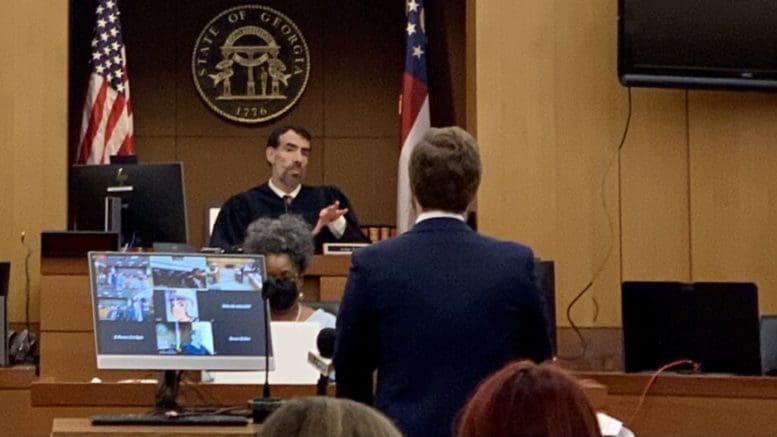by Stanley Dunlap, Georgia Recorder [This article first appeared in the Georgia Recorder, republished with permission]
August 29, 2022
A Fulton County judge has ordered Gov. Brian Kemp to testify in a special grand jury investigation into former President Donald Trump and associates’ attempts to interfere in the 2020 election.
Fulton County Superior Court Judge Robert McBurney ruled Monday that Kemp will appear before the grand jury following the Nov. 8 election in which the Republican will face Democrat Stacey Abrams. McBurney rejected arguments that the governor should not be forced to testify because of sovereign immunity, which protects the state from being sued without its consent, and dismissed claims that the Fulton court had no power to enforce the subpoena.
Kemp’s lawyers argued that since a special grand jury cannot criminally indict someone like a regular grand jury can, the Fulton probe should be considered a civil lawsuit instead of a criminal investigation.
Kemp’s legal team had accused Fulton District Attorney Fani Willis of targeting Kemp for political reasons and argued that the governor shouldn’t have to appear before the jury until after his election. But prosecutors noted that under state law, a special grand jury can investigate any type of violation and Kemp is only considered a potential victim who was targeted by Trump’s allies in their attempts to overturn Trump’s 2020 presidential loss to Democrat Joe Biden.
McBurney concluded the investigation is a criminal investigation, pointing out that the special grand jury is determining whether to prosecute people for disrupting the 2020 election and that there are several conversations Kemp had that are relevant to the investigation.
McBurney said that prosecutors and Kemp’s attorneys should work out details on what information would be considered off limits.
“(The grand jury’s) purpose is unquestionably and exclusively to conduct a criminal investigation: its convening was sought by the elected official who investigates, lodges, and prosecutes criminal charges,” McBurney wrote.
Kemp spokeswoman Katie Byrd said that McBurney’s decision is in line with Kemp’s position that any testimony should wait until after the election.
“Judge McBurney acknowledged the potential political impact of the timing of these proceedings and correctly paused the governor’s involvement until after the November election,” Byrd said in a statement. “Just as we have since April 2021, we will work with the D.A,’s office and the judge to ensure a full accounting of the governor’s limited role in the issues being investigated is available to the special grand jury.”
After the 2020 election, Kemp refused to call a special legislative session requested by Trump and allies in order to block the certification of Biden’s win.
Since its June convening, the special grand jury has heard from dozens of witnesses, including Trump’s personal lawyer Rudy Giuliani and Georgia Secretary of State Brad Raffensperger. The 23-member panel will recommend whether prosecutors should pursue criminal charges.
Kemp was originally expected to provide the special grand jury his videotaped testimony back in June, but the cooperation dissolved into bickering between the Republican governor and the Democrat-led district attorney’s office.
The motion to quash the subpoena was filed on the eve of Kemp’s scheduled testimony in August.
Kemp’s attorneys argued in court on Thursday that he was following state law by also protecting future governors from overzealous prosecution.
“This subpoena came only after weeks of tortured and tortuous negotiations over obtaining an interview with the Governor — the details of which do not bear repeating here, other than to note that both sides share responsibility for the torture and the tortuousness,” McBurney said.
Fulton prosecutors have been busy over the last month fending off a flurry of attempts to block subpoenas made by Kemp, U.S. Sen. Lindsey Graham and members of Trump’s inner circle, including Giuliani, who spent six hours on the stand two weeks ago.
On Monday, the Fulton District Attorney’s Office filed a response in U.S. District Court saying that the judge should deny Graham’s motion because the subpoena does not require him to disclose information that would be protected for congressional members.
Graham scored a legal victory over the weekend when the 11th Circuit Court of Appeals delayed the South Carolina official’s testimony.
Graham’s attorneys now have until Wednesday to respond to Judge Leigh Martin May, who will decide how much Graham can be compelled to talk about.
Graham contacted the Georgia secretary of state’s office twice following Election Day in 2020 to ask about disallowing questionable absentee ballots, a call that Raffensperger called concerning.
“Because Sen. Graham largely repeats the same arguments he has already presented, he has failed to respond to this court’s own findings,” Fulton prosecutors said. “The most glaring example of this is the heart of the Senator’s position: that his phone calls to Secretary Raffensperger were, by the nature, inherently legislative acts, and the special purpose grand jury’s inquiry actually only contemplates the phone calls. This is precisely the opposite of what this court has found.“
Georgia Recorder is part of States Newsroom, a network of news bureaus supported by grants and a coalition of donors as a 501c(3) public charity. Georgia Recorder maintains editorial independence. Contact Editor John McCosh for questions: info@georgiarecorder.com. Follow Georgia Recorder on Facebook and Twitter.

